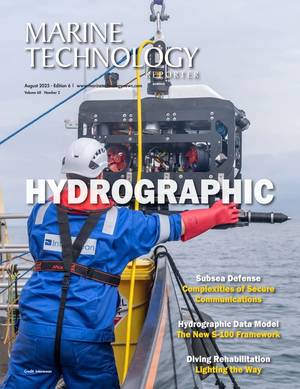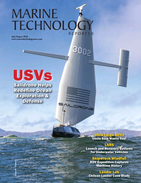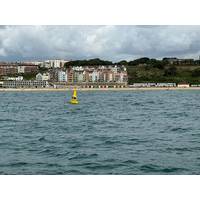
OSIL Launches "Beach Buoys" for Water Quality Monitoring
institutions, and industries such as aquaculture, wastewater management, and desalination plants to track critical water parameters remotely.Equipped with advanced sensors (measuring parameters including coliforms, Blue-Green Algae, Dissolved Oxygen and hydrocarbons) and location-appropriate telemetry systems, the buoy systems provide early warnings for pollution events, algal blooms, and contamination, allowing for rapid response. By automating water quality monitoring, organizations can reduce the need for manual sampling, optimize resource allocation, and ensure compliance with environmental
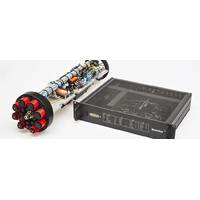
MacArtney Launches NEXUS 8 Multiplexer
, we have our own opinion on what a multiplexer should be able to do, but what's more important is what the customer and end-user expects and needs. We specifically wanted customer input on what they wanted from a new generation multiplexer and their requirements for new, advanced subsea telemetry systems when developing the NEXUS 8."NEXUS 8 is the latest addition to the NEXUS multiplexer family, designed to provide an efficient link between surface and seabed. This new model is smaller and lighter than its predecessor, specifically designed for environments where space is at a premium
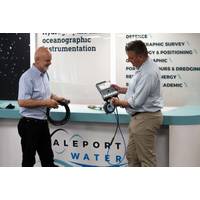
Valeport Water Ltd.: Valeport Expands through the Pandemic
is drawing on the manufacturing capabilities of the original Valeport company and the firm has restructured and expanded its HQ base to facilitate the growth of Valeport Water. Products in the Valeport Water portfolio including flow metres, fluorometers and turbidity sensors, loggers and telemetry systems are designed and manufactured at the firm’s riverside HQ in Devon, UK.Photo courtesy Valepor
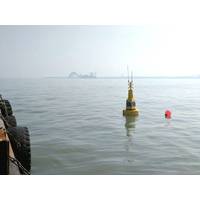
OSIL: Milestone in Dredge Monitoring Buoys
a stainless-steel sub frame with a moon pool for instrument protection, with a robust modular construction that facilitates shipping and ship and assembly on-site following delivery.Data can be relayed directly from the monitoring platforms onto client’s servers using the most suitable telemetry systems available (which can include multiple/dual telemetry systems), and OSIL regularly integrate client’s existing sensors to further minimise costs.OSIL have produced a large number of dredge monitoring networks for an extensive global customer base and are continually adapting and innovating
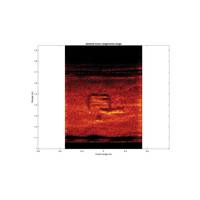
DOLPHIN: Enabling Technology for Acoustic Systems
Phase 1 is complete and results will be presented in future publications.Figure 5: Two sonar swaths overlapping with DOLPHIN™ processing fill the typical nadir gap. Image: QinetiQ North AmericaPractical ApplicationsThe DOLPHIN processing technology can be applied to communications, sonar, and telemetry systems. In practice this will yield benefits to many markets and applications. Military operations will benefit from networking, clandestine communications, improved throughput, and increased tolerance for difficult acoustic conditions. One could envision DOLPHIN enabled networks of unmanned
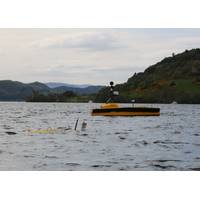
Symbiotic Autonomy for Deep Water Survey
project, part-funded by Innovate UK and Dstl, which set out to produce an integrated system to perform low cost, full water column marine surveys using multiple autonomous systems.During trials in and on the loch, Sonardyne’s ultra-short base line (USBL) acoustic positioning and AvTrak telemetry systems enabled ASV’s C-Worker 5 autonomous surface vehicle (ASV) to locate, track, command and control the NOC’s Autosub Long Range (ALR) autonomous underwater vehicle (AUV). Position and mission status updates were transmitted to shore via radio frequency (RF) communications.The need
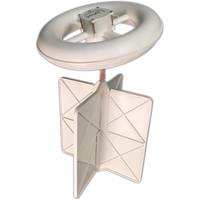
Meet the CARTHE Drifter
overheads in record time, thus reducing the price of the instrument and increasing large volume availability. The instrument is activated by a magnetic switch and can send its position every 5 minutes for a period of up to 3 months with meter accuracy using very-low cost GlobalStar Simplex telemetry systems. The client can receive the data in real-time through the Pacific Gyre LLC website, the official distributor of CARTHE drifters. Moreover, the “drogue-less” torus float can be deployed alone for surface oil slick tracking purposes. An air-dropped version, using a
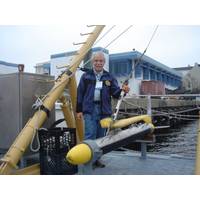
Klein's Side Scan Sonar, Then and Now
– deck cables, slip ring and tow cable – and selects data rate and filter settings that minimize telemetry errors while maximizing data throughput. This results in continuous, high quality imaging over a broad variety of cable types and cable lengths. In the case of standard fixed rate telemetry systems, they simply stop transferring data when the cabling will not support their required data rate. This could be caused by excessive length, aged or degraded cable or poor electrical connections. With our SMART telemetry design, if the automated test of the system cabling results in an available
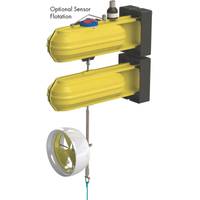
Atlantic Canada Profiles: Seaformatics Systems
Seaformatics Systems is a new startup ocean technology company with its sights set on changing the way oceans are monitored subsea – especially in remote and difficult to access, harsh environments – through its subsea power harvesting and telemetry systems. A barrier to collecting long term data in these environments is a sustainable supply of power to the instruments and data communications infrastructure. With the challenges imposed by such environmental conditions one of the only suitable power sources are batteries. Specialized vessels must be used to deploy and recover data from the

 August 2025
August 2025
